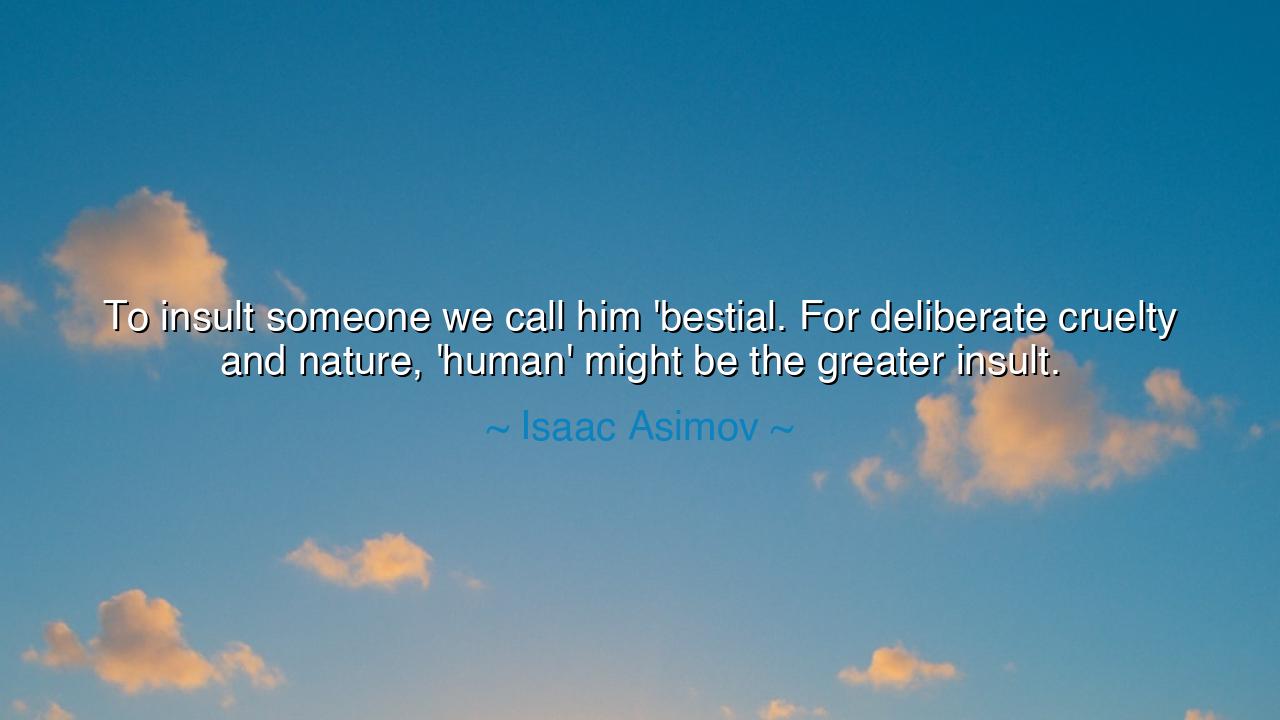
To insult someone we call him 'bestial. For deliberate cruelty
To insult someone we call him 'bestial. For deliberate cruelty and nature, 'human' might be the greater insult.






Hear the words of Isaac Asimov, prophet of reason and seer of futures yet to come: “To insult someone we call him ‘bestial.’ For deliberate cruelty and nature, ‘human’ might be the greater insult.” In this sharp saying there lies a mirror held to our kind, revealing both the light and the shadow that dwell within mankind’s breast. For when we cry “beast,” we speak of creatures who follow instinct, who kill to feed or defend, but not for malice, not for joy in suffering. Yet when man turns to cruelty, it is with a mind sharpened by intention, with a heart that sometimes delights in pain. Thus the beast is innocent in its savagery, but man is guilty in his cruelty.
To be called bestial is to be likened to the lion or the wolf, who hunt because they must, whose teeth are nature’s command. But to be called human — ah! there lies the deeper wound, for it means one has chosen cruelty not from necessity but from will. Only man burns villages not for hunger but for conquest. Only man devises tortures not for defense but for domination. Only man wages war upon his own species with cunning stratagems, seeking not survival but triumph over the broken bodies of others. This, Asimov teaches, is the greater insult.
Consider the tale of the Spanish Inquisition, when men, cloaked in holy authority, turned against their neighbors with racks, flames, and chains. Did the wolf ever invent such cruelty? Did the tiger ever torture its prey to make it confess to heresies of the wild? No — only man, with his reason twisted, could create such theaters of suffering. Here we see that the beast is noble in its simplicity, but man, corrupted, can become monstrous beyond the measure of any beast.
And yet, O listeners, we must not despair of humanity. For the same mind that plots cruelty can also craft compassion. The same reason that devises torture can invent medicines, laws, and works of art that uplift the soul. Consider Oskar Schindler, who in the midst of the Holocaust — the greatest descent into human cruelty — chose instead to save lives. Where others used cunning to destroy, he used it to preserve. Where others sharpened cruelty, he sharpened mercy. Thus within man lies both abyss and glory, and the choice belongs to him.
The meaning, then, is clear: our danger is not in being like the beasts, but in being too fully human without virtue, wielding intellect without conscience. For intelligence without compassion is the sword without the sheath, the fire without the hearth. It consumes, it devastates, it leaves only ash. Therefore, the true task of humanity is not to deny its nature, but to refine it, to yoke reason with love, power with justice, knowledge with humility.
So let us take these lessons into our hearts: judge cruelty not as “bestial,” but as the distortion of humanity itself. When you see another fall into deliberate harm, say not, “He is like an animal,” but rather, “He has forgotten what it means to be truly human.” And for yourself, ask daily: Am I using my reason to heal or to wound? Am I guiding my power toward creation or destruction? These are the questions that separate the noble human from the monstrous human.
In practice, cultivate compassion as diligently as you cultivate skill. Let your learning serve mercy. Let your power serve justice. When anger rises, remember that cruelty is not instinct, but choice, and you may choose otherwise. When bitterness tempts you to scorn, remember that the greater strength lies in mercy. For to be called human is not to be condemned, but to be summoned — summoned to rise above the cruelty that our kind alone can invent, and to embody the love that our kind alone can sustain.
Thus, children of the future, guard your humanity as one guards a flame in the wind. Do not let it flicker into cruelty, lest you become more terrible than any beast. Instead, let it blaze as compassion, as reason guided by love. Then, when one calls you human, it shall not be an insult, but the highest of praises.






AAdministratorAdministrator
Welcome, honored guests. Please leave a comment, we will respond soon